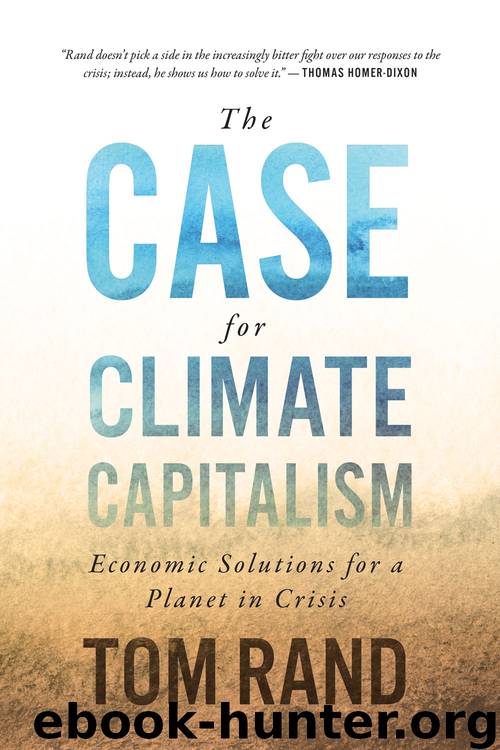The Case for Climate Capitalism: Economic Solutions for a Planet in Crisis by Tom Rand

Author:Tom Rand
Language: eng
Format: epub
Tags: Business & Economics, Economic Policy, Environmental Economics, Global Warming & Climate Change, Political Science, Public Policy, Science
Publisher: ECW Press
Published: 2020-03-03T03:00:00+00:00
* * *
i — An externality is an unaccounted-for cost (or benefit) that hits a third party who didn’t choose to take on that cost (or benefit). Throwing out garbage for free, for example, is an externality because someone else has to pay for the cleanup.
ii — By putting a value on existing functioning forests, like the Amazon, we might limit the appetite for deforestation. And by placing value on carbon reduction, we might stimulate the planting of millions of trees on what is otherwise marginal land.
iii — No-till farming limits the amount of CO2 released into the air, allowing farms to become more effective carbon sinks. Feeding cows a derivative of seaweed limits their methane production (mainly through burps).
iv — Linking personal choice to systemic change means more than voting for climate policy. When we each choose to fly less, buy a heat pump, or bike to work, we don’t act in isolation. We provide for tiny nodes of action that link to broader macro-changes. Social change is always a mix of top-down guidance (laws) and bottom-up choices. Those links become more effective when we amplify feedbacks between levels of action: codify lessons from early-movers, broadcast what best practices they discover, extrapolate personal carbon budgets to national budgets, etc.
v — Lowering reliance on fossil fuels through efficiencies, for example, is pure economic upside.
vi — Trump’s rejection of the Paris accord doesn’t come into effect until after the next presidential election, so it’s not certain that the U.S. will actually reject its (voluntary!) commitments.
vii — Bloomberg New Energy Finance.
viii — I emphasize here: if one does not make money in building and delivering solutions to a problem in a market economy, then there is no way that solution will permeate any portion of the economy outside where one imposes it. The presence of profit is what will drive other, less altruistic, investors into the space. Indeed, I argue that the most effective thing ArcTern could do is have enough success that sufficient competition arrives to put us out of business!
ix — I will say this: there are easier ways to make money than running a cleantech venture fund into which one has poured most of their net worth!
x — See Part Three, “Welcome to the Anthropocene” for some of the best guesses.
xi — My previous book, Waking the Frog, speaks to the futility of using cost/benefit analysis to justify climate action (see Chapter Four). A preference for quantified analysis, backed by models that fit into a spreadsheet, over qualitative assessments can blind us to severe, existential risks best characterized by the latter.
xii — The IEA are hardly climate alarmists. Assembled in response to the OPEC oil crisis, its main job is to advise governments about energy security. For most of its history, that meant how to keep oil, gas, and coal moving. Prior to coming out
Download
This site does not store any files on its server. We only index and link to content provided by other sites. Please contact the content providers to delete copyright contents if any and email us, we'll remove relevant links or contents immediately.
The Secret History by Donna Tartt(16622)
The Social Justice Warrior Handbook by Lisa De Pasquale(11489)
Thirteen Reasons Why by Jay Asher(7788)
This Is How You Lose Her by Junot Diaz(5770)
Weapons of Math Destruction by Cathy O'Neil(5036)
Zero to One by Peter Thiel(4824)
The Myth of the Strong Leader by Archie Brown(4789)
Promise Me, Dad by Joe Biden(4447)
Beartown by Fredrik Backman(4415)
Stone's Rules by Roger Stone(4415)
How Democracies Die by Steven Levitsky & Daniel Ziblatt(4398)
The Fire Next Time by James Baldwin(4342)
100 Deadly Skills by Clint Emerson(4076)
A Higher Loyalty: Truth, Lies, and Leadership by James Comey(4032)
Rise and Kill First by Ronen Bergman(4012)
The David Icke Guide to the Global Conspiracy (and how to end it) by David Icke(3881)
The Farm by Tom Rob Smith(3872)
Secrecy World by Jake Bernstein(3782)
The Doomsday Machine by Daniel Ellsberg(3730)
